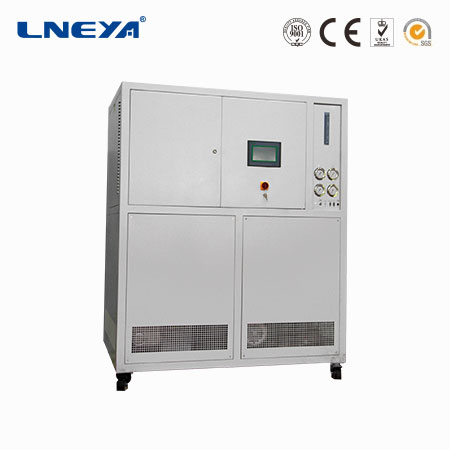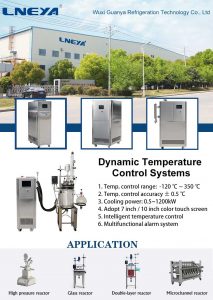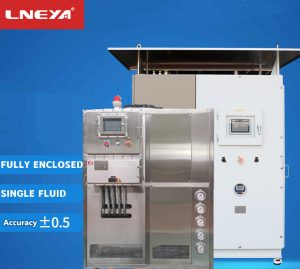What is the refrigeration principle of the glycol chiller system
Glycol Chiller System , as we can tell from
its name, it is to use Glycol as the refrigeration agent for the chiller.
In the all air environment, because of the
low temperature in the outdoors, it is impossible to use a cooling tower to
supply the inner area directly with the cold air-conditioner. In addition, the
cold air in the outdoors could be used directly as refrigerator source,with glycol
as refrigerant, it can introduce the natural cold air into the inner area and
supply cold air-conditioner. If we need to heat the outer area and provide
cooling for the inner area, we can turn off the chiller and Boiler or
industrial hot water is still used as heat source for external heating.
Install plate heat exchanger in the
outdoor, and the outdoor cold air is introduced into the plate heat exchanger
by the fan. The glycol solution and the outdoor cold air are exchanged in the
plate heat exchanger. The cooled glycol solution enters into the air
conditioners in the inner area and exchange with mixed air. Then the mixed air
enters into the inner room with lower temperature and supply cooling. The
temperature of glycol solution rise up, it comes back to the plant heat
exchanger in the outdoor again, exchange heat with the cold air in the outdoor
and continue this cycling after the temperature is lowered. This way of heat exchange is usually used in
the heat recycling system.
It is a very energy-saving way that use
glycol as a refrigerant to introduce the cold air in the outdoors to supply
cooling for the inner area. All we need to do is to install a heat exchanger in
the outdoor.when it works, the cold water equipment closed, opening the fan and
the glycol chiller can bring cooling for the inner area. In this way, we can
save energy and reduce the cost.
Our LNEYA self-developed low-temperature
refrigeration circulator, also known as the glycol chiller, has a cooling
temperature range from -125°C to -20°C, using a computer cascade temperature controller and a PT100
temperature sensor. The product adopts ethylene glycol and water mixture for
circulating refrigeration to save water resources; adopts supercooling
technology to ensure temperature stability at low temperatures; adopts a fully
enclosed design to ensure the purity of the cold heat transfer medium, prevent ice
crystals, and increase the life of the heat transfer fluid. There are two
temperature series, LX and LT, to meet the low temperature control requirements
of chemical and pharmaceutical low temperature reactions. You can contact us to
obtain the detailed parameters of the temperature range you need.
Related recommendations
-
The role of the chemical and pharmaceutical reactor chiller
1979In the process of pharmaceutical synthesis and fine chemical operation, we often encounter strong exothermic reactions such as oxidation reaction and acid-base neutralization. For these strong exothermic reactions, if the control is improper or th...
View details -
LNEYA isolation explosion-proof cooling heating circulation system SR-35N
1008LNEYA isolation explosion-proof cooling and heating circulation system mainly uses heat transfer medium for heating and refrigerant for cooling. So what are the main accessories in the isolated cold and hot water circulation system? What effect do...
View details -
Brief introduction of explosion-proof curve heating and cooling thermostat
1515The explosion-proof curve heating and cooling thermostat SUNDI series adopts compressor refrigeration and linkage heating technology, an integrated piping system, and a plate heat exchanger. It is suitable for equipment connecting reactors for ref...
View details -
Working principle of refrigeration and heating thermostat for chemical industry
1580In the selection process of the special refrigeration and heating thermostat for chemical industry, the heating power and the pressure and flow rate of the heat transfer medium are also factors to be considered. Different raw materials have differ...
View details
 LNEYA Industrial Chillers Manufacturer Supplier
LNEYA Industrial Chillers Manufacturer Supplier













